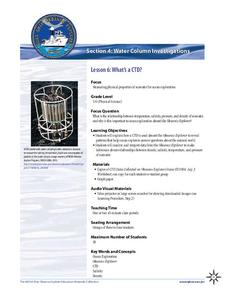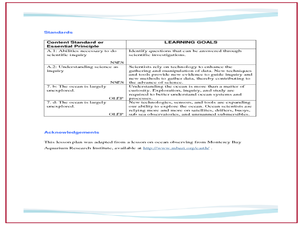NOAA
A Day in the Life of an Ocean Explorer
What's life like aboard an ocean exploration vessel? Junior oceanographers examine the important role of communication in ocean research in lesson two of a five-part series from NOAA. The materials introduce the class to life on board...
National Geographic
Ocean Exploration
Dora, Dora, Dora, Dora, Dora! This may be your little ones' best guess as to what it's like to be an explorer! Give them a deeper understanding with this compact examination. A four-minute video introduces them to Robert Ballard, the...
NOAA
Through Robot Eyes
How do robots assist ocean explorers in collecting data and images? The final installment in a five-part series has science scholars examine underwater images collected by robots and identify the organisms shown. Groups then calculate...
Read Works
Columbus Was an Explorer
Get the inside scoop on the European explorer, Christopher Columbus, with a response to reading worksheet that requires scholars to answer who, what, why, when, and a variety of other questions about the word crew.
University of Southern California
What Is The Ocean?
Go on a tour of the ocean through the lens of a scientist. Learners read maps of the ocean floor, study tide behavior, examine wave motion, and analyze components of soil. Each lesson incorporates a hands-on component.
NOAA
What Little Herc Saw
See the underwater world through a different pair of eyes! Middle school marine biologists identify deep-sea organisms by examining images taken by an ROV from the Okeanos Explorer. After determining what creatures lie beneath the...
NOAA
Calling All Explorers
Let's get moving! The second installment of a 2-part series of six adventures helps learners take part in individual explorations by sea and by land. After navigating the waters in an informative WebQuest, groups create and hide their...
Curated OER
Ocean Exploration: Shapes and Patterns Under the Sea
So many shapes in our vast oceans. Young explorers can discover new shapes in a variety of ways in this lesson. One way is having free exploration with a pattern shape kit handed out by the teacher. Another is by viewing a video, Ocean...
NOAA
Mapping the Deep-Ocean Floor
How do you create a map of the ocean floor without getting wet? Middle school oceanographers discover the process of bathymetric mapping in the third installment in a five-part series of lessons designed for seventh and eighth graders....
NOAA
Ocean Exploration
Sea explorers and scientists have found that because of temperatures being two to three degrees Celsius at the bottom of the ocean, most animals are lethargic in order to conserve energy. In this web quest, pairs of learners read about...
NOAA
Build Your Own Ocean Ecosystem
Hold the sea in the palm of your hand! Amateur oceanographers work together to create models of an ocean ecosystem in the sixth and final installment in a series. Raise awareness of global ocean health issues through guided research,...
NOAA
What's a CTD?
Why are the properties of the water important when exploring the ocean? Young scientists discover the tools and technology used in deep sea exploration in the fourth installment in a five-part series. Groups work together to examine...
University of Southern California
What Lives In The Ocean?
One of the most diverse environments on Earth is the ocean. Young scientists explore the living things found in the ocean during an exciting seven-lesson unit. Their study includes organisms from plankton to invertebrates and vertebrates...
Centers for Ocean Sciences
Ocean and Great Lakes Literacy: Principle 7
Your mission, should you choose to accept it, is to take your class on an underwater adventure. The final installment in a seven-part series involving salt and freshwater bodies takes junior oceanographers below the surface in...
Curated OER
Early Explorers
Fifth graders investigate the routes taken by the early explorers. In this explorers lesson, 5th graders use interactive notebooks, discussion and maps to discover the routes taken. Students get into pairs and label maps, and create...
Curated OER
Spanish Explorers and Conquistadors
Prior to taking a test of the Spanish explorers and conquistadors, have students review with this informative PowerPoint. Fifth graders will feel more prepared after using this slideshow as a guide to their studying.
Curated OER
Seashore Explorers
There are three separate lessons within this resource that can be used together, or that can each stand alone. In the first, five simple activities allow junior scientists to examine the amazing properties of water. In the second, they...
Curated OER
Magellan and Coronado
The best part of elementary school is learning about the explorers. Take your 5th graders on a quick trip with European explorers Coronado and Magellan. Described here are their routes, personal histories, and encounters in the New...
NOAA
The Oceanographic Yo-yo
How does chemistry help deep-sea explorers? Part four of a five-part series of lessons from aboard the Okeanos Explorer introduces middle school scientists to technologies used in ocean exploration. Groups work together to analyze data...
Curated OER
Christopher Columbus
Some very good graphics are included in this informative presentation on the life of Christopher Columbus and the voyages he took. Among other things, students discover that Columus missed the chance to be the first European to view the...
Curated OER
Ocean Observations
Students examine a coastal ocean. For this physical science/earth science lesson, students generate a list of questions about how researchers study the ocean. In addition, students investigate, through research on the computer, to answer...
NOAA
Off Base
How does carbon dioxide affect the world's oceans? The final installment in a series of six lessons has pupils research ocean acidification, then conduct an experiment to witness the delicate balance that exists in our seas. Materials...
Curated OER
Ocean Currents
Learners determine how water and wind affect ocean currents. In this science investigation lesson, students follow the provided steps to enable them to consider how explorers may have used ocean currents to their advantage.
Curated OER
Ocean Exploration Time Lines
Students investigate ocean explorations. They conduct Internet research, and create a chronological timeline of various ocean explorations.

























